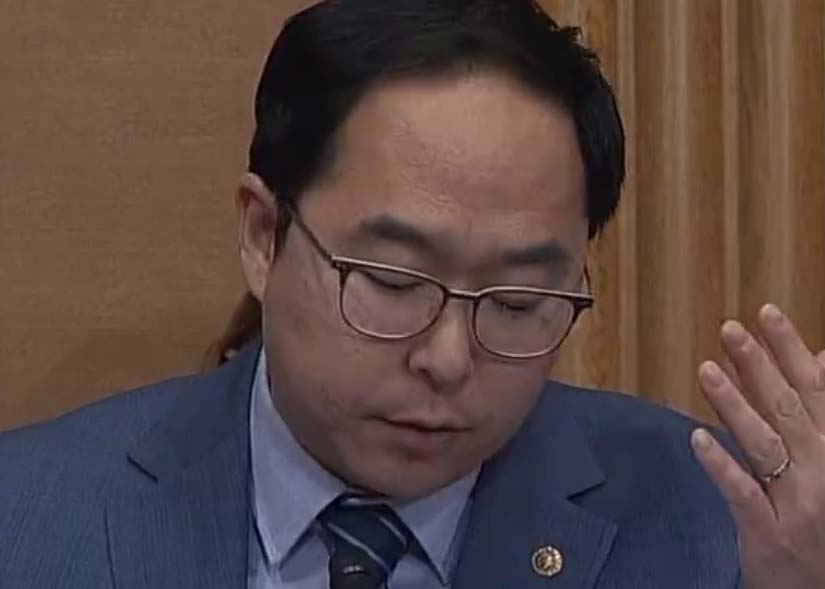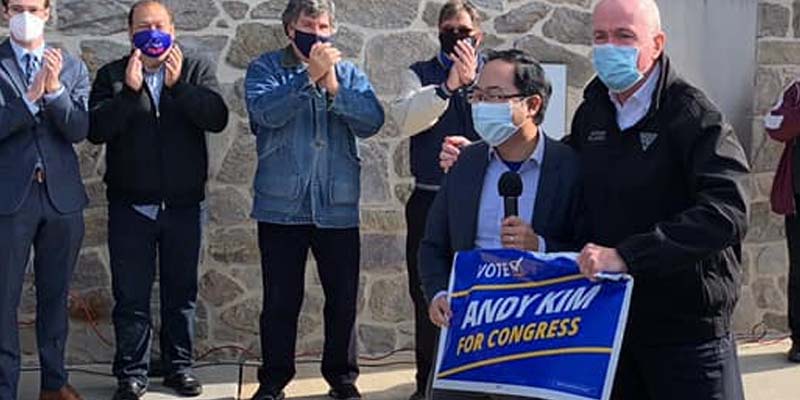MARLTON, NJ – When U.S. Senator Andy Kim first entered Congress, he faced an unexpected hurdle: a delay in obtaining his security clearance. Kim, a New Jersey Democrat and the first Korean-American senator, has publicly attributed this delay to anti-Asian bias and discrimination.
It’s a compelling narrative, especially in a time when Asian Americans have faced heightened scrutiny and prejudice. But Kim has yet to provide concrete evidence to substantiate these claims—no documents, no specific incidents, just an assertion that fits neatly into a broader conversation about systemic racism. While discrimination is a real issue that deserves serious attention, there’s another possibility worth considering: maybe the delay had less to do with Kim’s heritage and more to do with his past affiliations.
Before his congressional career, Andy Kim was linked to Rise Stronger, a group that emerged in the tumultuous political climate of the mid-2010s. Rise Stronger billed itself as a grassroots movement, a “United States of Resistance” aimed at countering government policies during the Trump era. But its rhetoric and activities raised eyebrows.

Former U.S. Congressman Tom MacArthur, a Republican who clashed with Kim during his 2018 campaign, flagged Rise Stronger as a potentially dangerous far-left organization.
MacArthur pointed to the group’s alleged promotion of dissent through what he called “communist propaganda,” including encouraging followers to dive into Marxist literature and even books penned by individuals convicted of killing police officers.
These are serious accusations, and while they come from a political rival, they align with concerns raised by others at the time.
It could be that Kim’s Asian heritage had less to do with the delay and more to do with his support of violent anti-Trump and anti-government radicalism.

Rise Stronger’s growth coincided with the rise of Antifa, the loosely organized, militant anti-fascist movement that became a lightning rod for controversy. Both groups shared a disdain for established authority and a willingness to confront it head-on, though their methods and visibility differed. Posts on X from outlets like Shore News Network, which tracked Kim’s early career, claim that Rise Stronger’s radical leanings prompted scrutiny that led Kim to distance himself from the group after public backlash.
The website for Rise Stronger was reportedly shut down following these criticisms, with Kim asserting he had little to do with its operations—a convenient pivot for an aspiring politician.
Could this be the real reason behind Kim’s security clearance delay?
The process for granting clearances is notoriously opaque, often hinging on an individual’s associations, past statements, and potential vulnerabilities to foreign influence.
If Rise Stronger’s activities veered into territory that alarmed investigators—say, advocating revolutionary ideologies or lionizing figures tied to violence—it’s plausible that Kim’s involvement, however tangential, triggered red flags. Marxism and cop-killer manifestos aren’t exactly subtle endorsements, and in the hyper-vigilant world of national security, such connections could easily stall an application.
Kim’s narrative of anti-Asian bias, while emotionally resonant, sidesteps this alternative explanation. Racism exists, and Asian Americans have historically faced unfair suspicion—think of the internment of Japanese Americans during World War II or the post-9/11 profiling of South Asians.
But leaping to discrimination as the sole cause of his troubles without evidence risks obscuring a messier truth. The lack of transparency from Kim about his Rise Stronger ties only fuels speculation. If he has nothing to hide, why not address these claims head-on? Why not release details about the clearance process to prove his point?
Skeptics might argue that this is just partisan mudslinging, a relic of Kim’s bitter 2018 race against MacArthur. Fair enough—political opponents often exaggerate to score points. Yet the timing and context of Rise Stronger’s activities, coupled with the group’s reported rhetoric, suggest there’s more to unpack. The federal government doesn’t delay clearances lightly; it’s a painstaking process designed to protect national interests, not to settle petty scores. If Kim’s past included even a whiff of radicalism, it’s not hard to see why bureaucrats might hesitate.
This isn’t to say Kim is a secret revolutionary or unfit to serve. He’s built a reputation as a pragmatic, hardworking senator, often seen cleaning up the Capitol after the January 6 riot—an image that hardly screams “far-left agitator.” But reputations are curated, and past affiliations don’t vanish because they’re inconvenient. The public deserves a fuller accounting of what happened with his clearance, not just a feel-good story about overcoming bias.
Maybe Andy Kim faced discrimination. Maybe he didn’t.
But until he offers proof—or confronts the Rise Stronger elephant in the room—the possibility lingers that his delay wasn’t about his race, but about his record. In an era where we’re quick to cry foul at systemic injustice, it’s worth pausing to ask: what if there’s another side to this story? One that’s less about prejudice and more about politics?
(OP-ED) by Shore News Network

